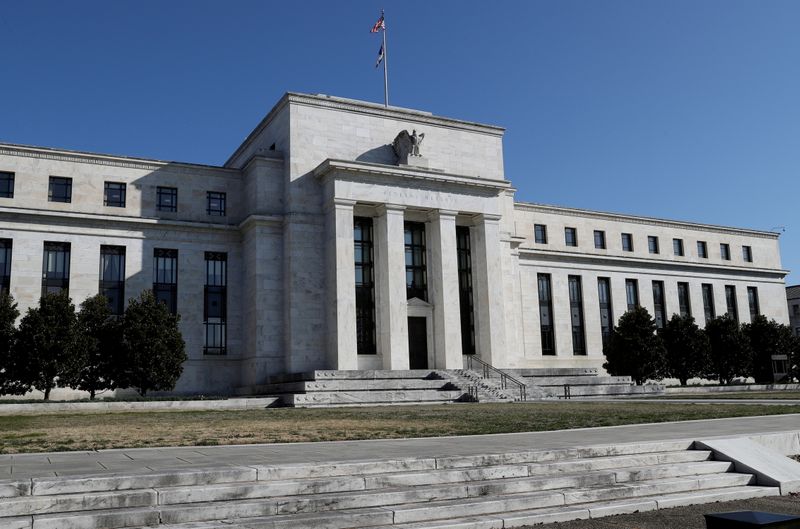By Lindsay (NYSE:LNN) Dunsmuir
WASHINGTON (Reuters) - More clues on just when and how the U.S. Federal Reserve may begin to cut its pandemic-induced bond-buying spree are likely to emerge on Wednesday when the central bank publishes minutes of last month's pivotal meeting.
Fed officials opened debate on dialing down their $120 billion a month of bond purchases at the June 15-16 meeting and since then most Fed policymakers have offered broadly bullish views of an economy that by many measures is sprinting out of a recession triggered by the global COVID-19 pandemic.
A number have signaled they see the recent run of job gains and above-target inflation as representing "substantial further progress" toward the Fed's maximum employment and price stability goals, a benchmark that would allow them to start tapering their asset purchases.
Data since their meeting could support that conclusion.
The United States added 850,000 jobs last month, the Labor Department's closely watched employment report showed on Friday, a better-than-expected acceleration in hiring after two straight months of weaker gains.
The Fed's preferred inflation gauge, meanwhile, has surged at the fastest annual pace since 1992 and is well north of its 2% target.
Wednesday's readout will likely provide more detail on how close Fed officials thought the central bank was to achieving its goals even before the latest economic data. It may also shed light on the depth of the split among those who see recent high inflation readings as temporary or longer lasting.
"The minutes will certainly be interesting," said Sam Bullard, a senior economist at Wells Fargo (NYSE:WFC). "The market is going to be looking at any details about the appetite to discuss the timing of when it's appropriate to start tapering."
A QUESTION OF WHEN
Many Fed officials at that June meeting brought forward their forecasts for raising interest rates from near zero. Thirteen of 18 policymakers now see rates higher in 2023, with seven of those penciling in a rate ‘lift-off’ as soon as next year.
Economists polled by Reuters see the Fed announcing a strategy for tapering its asset purchases in August or September with a cut to its bond buys beginning early next year.
Fed officials agree they will scale back their extraordinary bond purchases as a first step before raising interest rates. In December they established a threshold for tapering: The economy must make "substantial further progress" on achieving maximum employment and persistent 2% inflation.
The inflation measure tracked closest by the Fed rose 3.4% in May from a year earlier but there are still 6.8 million fewer people employed than just before the onset of the pandemic and the labor force remains 3.4 million below pre-pandemic levels.
Some policymakers, such as Dallas Fed President Robert Kaplan, have cautioned that the jobs hole may not be fully filled before interest rates will need to rise. More than 2.5 million Americans over 55 have retired since the pandemic began.
"The stronger gain in June payrolls will embolden those Fed officials calling for an earlier end to the Fed's asset purchases," said Andrew Hunter, a senior economist at Capital Economics.
MBS VS TREASURIES
The minutes may also shed light on any initial discussion about how the central bank intends to scale back its monthly bond purchases of $80 billion in Treasury securities and $40 billion in mortgage-backed securities.
In the last such exercise in 2014, the taper proceeded effectively on auto-pilot - with equal measures of Treasuries and MBS cut after each policy meeting - even as officials said it was not on a pre-set course.
In recent weeks, though, a few Fed officials have appeared sympathetic to critics who argue against the need for the central bank to continue buying housing-backed assets in a red-hot real estate market, while cautioning the Fed prefers to taper in the most predictable way possible.
But New York Fed president John Williams has noted that shifting purchases from MBS to Treasuries would have only a small effect on mortgage rates.

"I think the fact that we're hearing that...is a reflection that they haven't had that discussion," said Julia Coronado, a former Fed economist and president of economic-advisory firm MacroPolicy Perspectives.
She believes a more substantial briefing at the July meeting from the staff who oversee the bond-buying program will quash the argument to cut mortgage-backed securities at a faster pace. "Once the New York Fed staff and leadership fully lay out all the issues, they are not going to be saying such silly things."